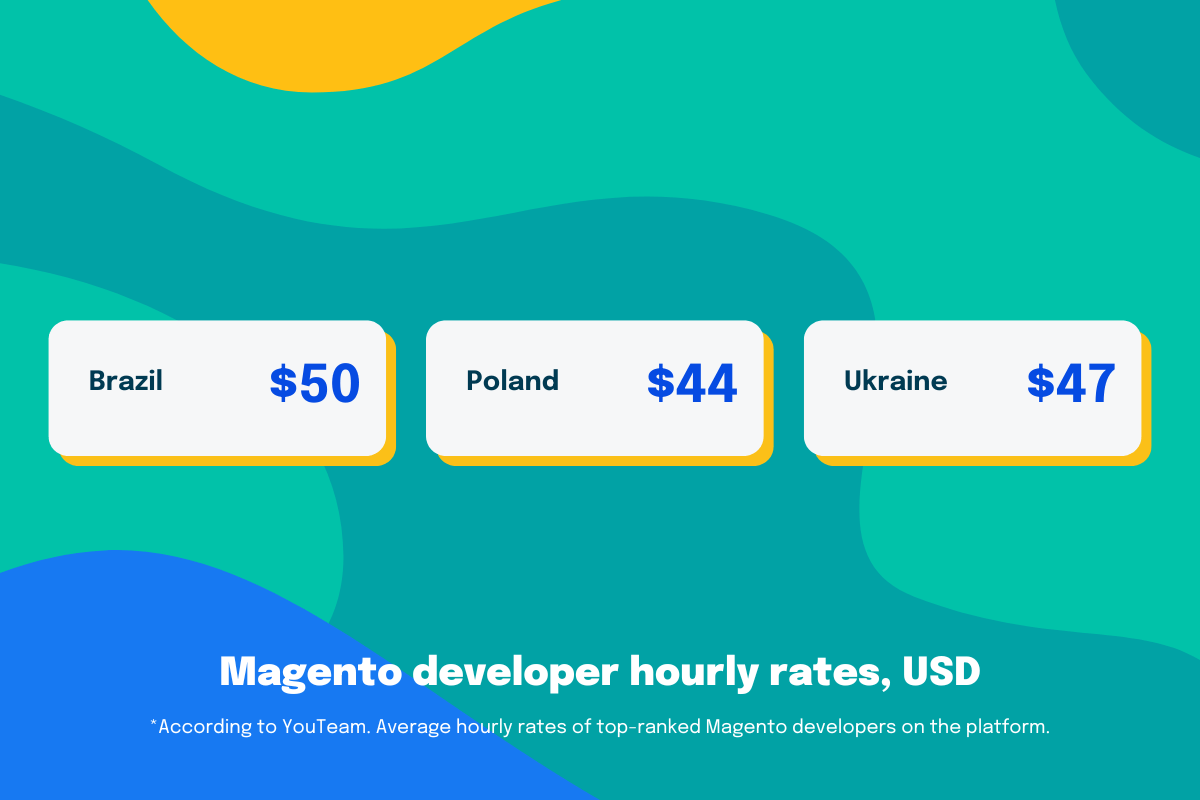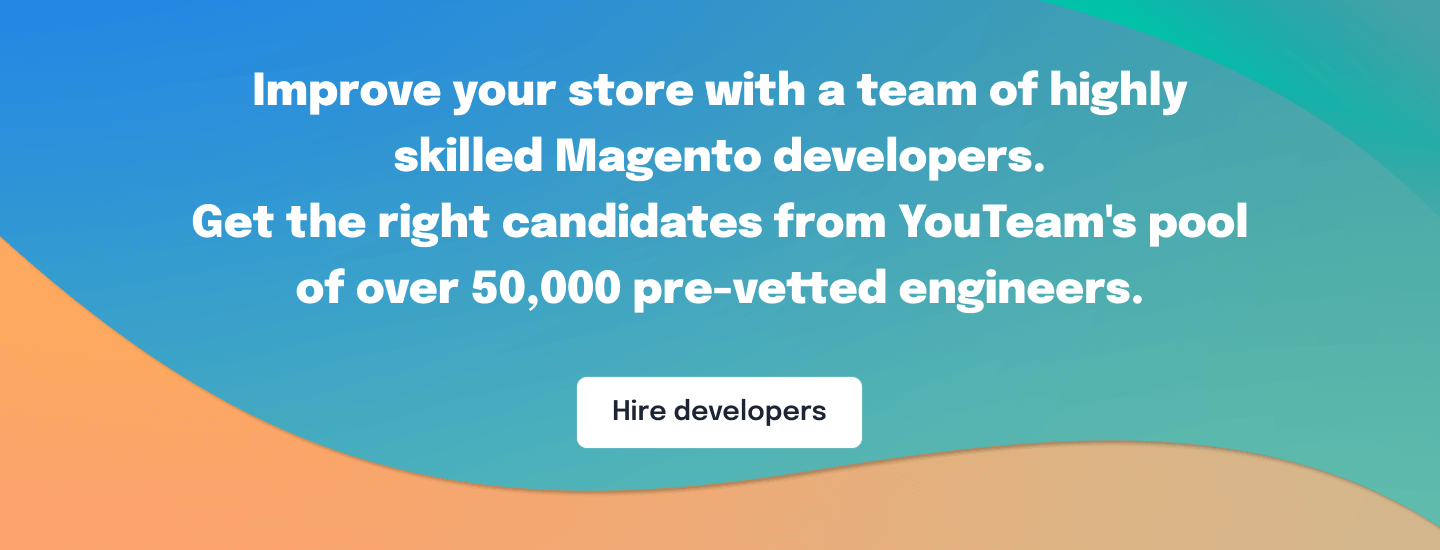Magento is a powerful platform that offers flexible customizations, nearly infinite scalability, and mobile-friendliness, providing a solid foundation for building and maintaining your web store. However, developing a successful e-commerce website requires a skilled Magento development team.
This guide covers every aspect related to achieving your next goals with the help of a skilled Magento developer – from defining your project needs to choosing the right hiring platform and efficiently evaluating potential candidates.
Table of Contents
What are the benefits of using Magento for a thriving e-commerce business?
Let’s focus on the most crucial aspects that influence companies’ choice of Magento as the platform for developing and maintaining their e-commerce projects.
- Mobile-friendly solution. The websites developed with Magento are adaptable to all screen sizes and browsers. In addition, the platform’s various mobile app builders allow developers to create an iOS or Android application without deep coding knowledge.
- Customization. With native Magento configuration options and its additional modules, developers can adjust the look and feel of the store and manage its attributes, site structure, security settings, and search engine.
- Advanced SEO features. Magento Open Source SEO extensions and Adobe Commerce (previously known as the Enterprise edition) built-in SEO settings improve the flow of organic traffic using keyword optimization, metadata management, XML sitemap generation, and enabling canonical meta tags.
- Powerful content management. Magento’s intuitive drag-and-drop interface allows companies to edit e-commerce web pages and create widgets to display dynamic content such as recently viewed products and orders and returns. Developers, in turn, can design custom widgets to address the unique needs of an online store.
- Advanced reporting. Magento’s business intelligence tool provides measurable results in visual form. The reporting includes the number of orders, average order value (AOV), taxes and collection of shipping fees, the best-selling products by revenue, and products added to wishlists.
- Scalability. Magento is infinitely scalable – it can handle large product catalogs and process thousands of transactions per hour. The platform is suitable for businesses at every stage. Companies with ambitious growth prospects can upgrade to Adobe Commerce, use ready-made extensions, or hire experienced Magento developers who can effectively scale an online store and develop complex functionalities.
- Multi-store support. Companies can build multiple Magento stores on the same backend. The platform allows them to manage each store’s product catalog, billing, and customer information from a single dashboard.
Platforms for hiring professional Magento developers
We provide four options to hire Magento developers for companies that need to quickly scale their development teams up or down and acquire specialized skills without the commitment of permanent employment. We focused on platforms that offer pre-screened Magento developer positions and a trial period.
1. YouTeam
YouTeam is a network of 50,000 vetted software engineers from hundreds of development companies in Latin America and Europe. With YouTeam, companies can integrate skilled Magento developers into their engineering teams, drawing from a pool of English-speaking professionals experienced in remote work and fast-paced environments.
The platform identifies the right candidates through a multi-stage vetting process. First, YouTeam checks their partner agencies by conducting meetings with CEOs, CFOs, and project managers, while its legal team examines each agency’s background, legal records, and previous clients.
Next, YouTeam conducts in-depth screenings of suitable candidates for each Magento developer position. The platform provides each customer with a matching expert who remains with the company throughout the entire collaboration with contractors. This expert assists with onboarding, scaling the team up or down, and performance reviews. YouTeam also automates contract signing and billing processes between its clients and software development agencies.
Take a look at YouTeam’s portfolio of selected e-commerce projects to see the skills our developers bring to the table.
2. Arc
Arc.dev is an online platform that offers both permanent full-time engineers and part-time freelancers, readily available for interviews. The company evaluates candidates for remote work compatibility, English proficiency, and communication skills. Candidates also take a coding challenge or a tech interview. The company claims that only 2.3% of registered developers pass technical and behavioral assessments before being offered to a customer. In addition, the Arc team regularly reviews developer projects to ensure performance meets their requirements.
According to its website, Arc developers are located in the U.S., Europe, and Latin America. The company has also partnered with Deel and Remote, compliance and payroll platforms, to make offshore hiring easier.
3. Toptal
Toptal is a worldwide network of software engineering, design, and finance talent. The company interviews its developers for language proficiency, interpersonal skills, and problem-solving abilities. In addition, each candidate undergoes live coding tests and completes a real-world project.
Toptal customers work with assigned technically savvy industry experts who understand the customers’ goals, technical needs, and team dynamics. Each expert accompanies newly hired Magento developers through a trial period, ensuring they are the right fit before starting the engagement.
4. Turing
Turing is a hiring platform that features an AI-powered vetting process and offers full-time engineering contractors and managed teams. The platform provides automatic time tracking, virtual daily stand-ups, and time zone management to give customers greater visibility into remote developers’ work.
Turing evaluates Magento developers for English fluency and proficiency in developing Magento modules, configuring e-commerce stores, and optimizing the performance of Magento e-commerce websites. Each developer undergoes an automated work experience survey that includes questions in five areas: project impact, engineering excellence, communication, people, and direction.
Turing has developers in 150 countries. Most of its customers are based in the U.S., while its developers are required to have a 4-hour overlap within the client’s time zone to ensure successful communication.
| Platform | Talent Pool | Pricing | Geography | Vetting | Quality Guarantee | Time to Candidates | Time to Contract |
| YouTeam | Full-time engineers from software agencies | 10% commission; Senior engineer avg. $60/hr or $9,000/mo | Latin America, Europe | Compliance checks, English pre-interview, soft skills interview, skill verification | 1-month trial | 2 business days | 1 week |
| Arc | Part-time freelancers, full-time contractors | Custom fee per hire; $60-$100/hr for freelance; $50,000-$200,000/yr for permanent hire | U.S., Europe, Latin America | Application screening, coding assessment, hands-on project, behavioral interview | 2-week trial (contract); 3-month guarantee (permanent hire) | 3 days | 1-3 days (contract); 2 weeks (full-time) |
| Toptal | Freelancers | $100-$150/hr; $500 initial deposit | Americas, Europe | Technical interview, live coding test, real-world project | 2-week trial | 2 days | 1-3 weeks |
| Turing | Full-time contractors, managed teams, custom software services | Service fee (details pending) | Worldwide | Technical skills test, English test, live coding, communication skills interview | 2-week trial | 3-5 business days | No data |
In addition to hiring platforms, companies can visit Clutch to find certified Magento developers and choose the right partner based on the experience and completed projects. Businesses can also search for custom Magento development services on LinkedIn by filtering results by location and industry.
What level of technical knowledge should companies expect from Magento developers?
Magento developers must have a solid technical background in programming, systems analysis, and database design, as these skills form the foundation of e-commerce website development. Companies often expect candidates to have a degree in computer science or software engineering, a proven track record of successfully completing projects, and a strong understanding of the features and capabilities of the Magento platform.
Top-level Magento developers require the following technical skills:
- Proficiency in PHP and MySQL: Ability to create product categories and shopping cart systems, build user authentication features, protect sensitive data, and implement payment processing using PHP and MySQL.
- Strong familiarity with the Magento framework: Good understanding of Magento’s modular and event-driven architecture, its folder structure, and product catalog management.
- Knowledge of HTML, CSS, and JavaScript: Building responsive websites using HTML, CSS, and JavaScript, including frameworks such as jQuery, React, or Vue.js.
- Module development: Proficiency in creating and upgrading custom Magento modules, extensions, and plugins to enhance the e-commerce website’s functionality.
- Theme development: Ability to create and customize Magento themes using a responsive approach while avoiding conflicts and issues after updating Magento or installing a custom extension.
- Integration: Experience in integrating Magento with other business systems, such as ERP, CRM, accounting tools, payment gateways, and logistics providers. Effective integration should reduce order processing time, eliminate data entry errors, and ensure consistency of customer and product information across multiple systems.
- Optimizing performance: Conducting a website performance audit to identify areas for improvement, updating Magento to the latest stable version, reviewing third-party plugins, optimizing CSS files, and rewriting JavaScript logic to enhance render speeds.
- Testing and debugging: Using testing frameworks and techniques to detect and fix bugs and errors, uncover security vulnerabilities, and maintain the integrity of the existing Magento codebase while adding new functionality.
- E-commerce domain knowledge: Solid knowledge of e-commerce best practices, customer experience, typical difficulties unique to the e-commerce sector, and effective marketing and SEO strategies.
Top interview questions for hiring Magento developers
Companies should ask questions that directly address the specific nuances of the projects Magento developers will be working on. These questions will help determine whether candidates are enthusiastic about their future tasks. Based on our experience interviewing Magento experts, we’ve compiled questions we usually recommend to our clients.
- What are you looking for in your next position?
- What has been your most recent professional achievement using Magento development practices? Are there any projects that you executed exceptionally well?
- How long would it take you to learn a new tool or build a specific skill set?
- What are Magento development tools that you’re just not interested in or struggle to use?
- Give an example where you faced very poor e-commerce website architecture. How did you approach that problem?
- How do you manage the expectations of non-technical team members and clients when working on a Magento project? Can you provide examples of situations where you had to explain complex concepts or negotiate realistic deadlines in light of an ambitious project scope?
- How do you handle a Magento website that has been breached?
- How would you address conflicts in extension compatibility?
Hiring companies can also use virtual skill assessments or provide Magento developers with paid trial projects that simulate the real tasks they will encounter as employees or contractors.
Finally, businesses should discover how a candidate’s values and behaviors align with the company’s culture. Since Magento experts communicate with different departments, they need strong interpersonal skills to cultivate a collaborative environment.
Things to keep in mind before hiring Magento developers
Before diving into the salaries and rates of remote Magento developers, we want to discuss three aspects that technical leaders and hiring managers should consider when hiring developers or choosing an outsourcing vendor.
Define the project requirements and goals
Decide how you wish to achieve your business goals with a dedicated Magento developer by creating detailed project requirements:
- Document every step of your project execution, including a summary of objectives, methods, tools, and frameworks to be used.
- Create a roadmap that defines the sequence of component development.
- Compare the project’s tech stack to what your existing team can and cannot cover.
- Outline the necessary skills and experience, and define performance-based requirements to set clear expectations for the developers.
The more specific you are about what you want to build, the better a Magento developer will understand your project goals, leading to more efficient budget planning and better results.
Choose a hiring model
You can choose from the following hiring models based on the requirements and timeline of your Magento project:
Outsourcing
Tech companies typically use outsourcing to focus on the core aspects of their business, delegating non-essential tasks to external providers. Companies also turn to outsourcing when they face difficulties finding tech talent in their local market.
Staff augmentation
Staff augmentation is a form of outsourcing that engages full-time software engineers from outsourcing agencies who work under the supervision of the hiring company’s management. The augmented contractors collaborate directly with the in-house team, allowing the company to maintain full control over project management.
This model is ideal for companies looking to quickly scale their development efforts by hiring dedicated Magento developers. In addition, staff augmentation companies simplify the legal aspects of hiring offshore developers and help reduce tax burdens in the client’s country.
Hiring in-house talent
In-house talent is typically hired locally and works within the same time zone, allowing companies greater control over the direction and management of their employees compared to outside contractors. Therefore, hiring in-house talent is generally more suitable for long-term or ongoing projects. This approach involves actively investing in a Magento developer’s career and encouraging their commitment to the company’s future goals.
Review developer portfolios and customer feedback
In addition to asking developers about their accomplishments, reviewing their portfolios can provide evidence of their tech skills, as well as insight into their work styles and creativity.
When searching for skilled Magento developers through hiring platforms or outsourcing companies, look for their online reviews. Check catalogs like Clutch or G2 and visit the development company’s website for case studies and customer success stories. While agencies often request feedback from their most loyal clients, having positive reviews is still a good sign. If a Magento development company has received favorable reviews, it means it has found at least a few customers willing to invest their time in working with it.
Browse 500+ Dev Teams Available for Hire
How much does it cost to hire a Magento developer?
Due to the shortage of Magento developers in the United States, companies are hiring full-time contractors from other countries who have experience working remotely in dynamic environments. The advantage of hiring contractors is that in countries like Poland or Brazil, their rates are 1.5 to 2 times lower than those of their counterparts in the U.S. or Western Europe.
We’ve compiled a list of average hourly rates for top-rated Senior Magento developers on the YouTeam platform.
| Country | Average hourly rate, USD |
| Ukraine | $47 |
| Poland | $44 |
| Romania | $50 |
| Brazil | $50 |
*According to YouTeam
We’ve also compiled information on the average salaries of Senior Magento developers from Glassdoor. Please note that the platform considers the earnings of engineers with varying degrees of expertise, meaning that actual salaries may differ from case to case.
These figures represent the midpoint of the ranges from Glassdoor’s proprietary Total Pay Estimate model and are based on salaries collected from platform users. Wages in India, the United States, Canada, Mexico, and the United Kingdom consist of a base salary and additional compensation, which may include cash bonuses, commissions, tips, and profit sharing.
| Country | Median annual salary, USD |
| United States | $138,000 |
| Canada | $81,000 |
| Mexico | $33,000 |
| Brazil | $31,000 |
| United Kingdom | $67,000 |
| Germany | $75,000 |
| Romania | $37,000 |
| Ukraine | $42,000 |
| India | $14,000 |
| Australia | $73,000 |
*According to Glassdoor
FAQ
What are the hourly rates for Magento developers?
Do I need ongoing support after my Magento website is developed?
Ongoing support for the Magento website is crucial to ensure the online store remains responsive, fast, and secure. Expert Magento developers have virtually unlimited opportunities to modify the e-commerce software, including fixing bugs, adding new features, and optimizing or redesigning existing code. Here are some examples of maintenance practices regularly performed by the development team:
Performance optimization. The online store’s search rankings and user experience depend directly on page loading speed. Magento developers’ role is to regularly review the PageSpeed Insights report and improve core vitals such as First Input Delay, Largest Contentful Paint, and Time to First Byte.
Troubleshooting. Continuous maintenance of the Magento website involves quickly identifying and resolving any issues that may arise. Developers must address any pending user-reported issues and ensure that the Magento store’s code meets coding standards after customizations, updates, or the installation of new extensions.
Improving website usability. Developers regularly assume the role of a customer to test the functionality of the Magento store and identify areas for improvement. They must ensure intuitive navigation, accurate order and payment processing, and effective account management.
Ensuring security. Developers perform regular security checks and keep Magento updated with security patches to protect the online store and customer data, including credit card details.
Where can I find and hire Magento developers?
Companies that need to quickly ramp up their Magento development without the commitment of permanent employment can use hiring platforms like YouTeam, Toptal, Arc, and Turing. Each of these platforms offers pre-vetted Magento developers, a trial period, and ongoing customer support.
In addition to hiring platforms, companies can visit Clutch to find Magento development companies and choose the right partner based on their experience and completed projects. Businesses can also search for professional Magento development services on LinkedIn by filtering results by location and industry.
How YouTeam simplifies hiring Magento developers
The YouTeam platform allows companies to quickly address skills gaps with additional expertise. The process of hiring a Magento developer with YouTeam looks like this:
- You request a call and describe your Magento development project and your vision of the ideal candidate.
- Your Matching Expert creates an Ideal Candidate Profile that meets your criteria, including the tech stack, industry experience, and professional development preferences.
- YouTeam finds suitable Magento developers among hundreds of partner agencies. Our experts pre-screen talent to create a shortlist of candidates who closely match your Ideal Candidate Profile. The first batch of profiles will be ready within 48 hours.
- You receive and review your candidate shortlist and select the software developers you want to interview. If you’re not satisfied with your shortlist, the Matching Expert will source new candidates.
- The final stage is contract signing. YouTeam contracts are locally compliant and standardized. The platform ensures secure intellectual property (IP) transfer and guarantees the implementation of technical and organizational security practices to protect personal data against unauthorized processing.
If you enjoyed this blog, why not read about the most popular e-commerce platforms and how to choose the right software stack for your next project in our Ultimate Guide to Custom E-commerce Website Development?









